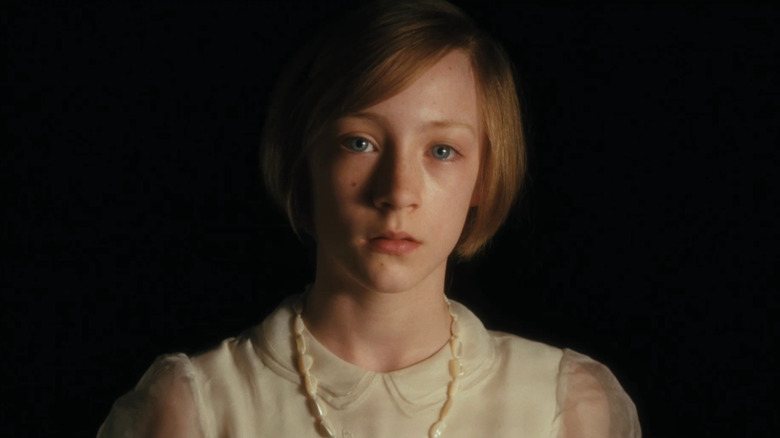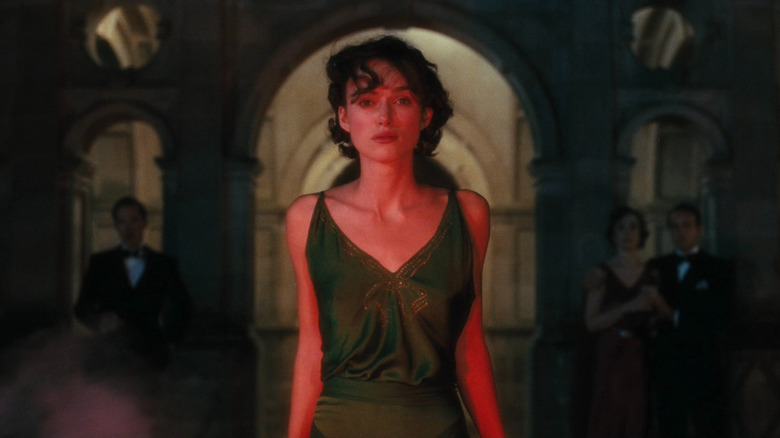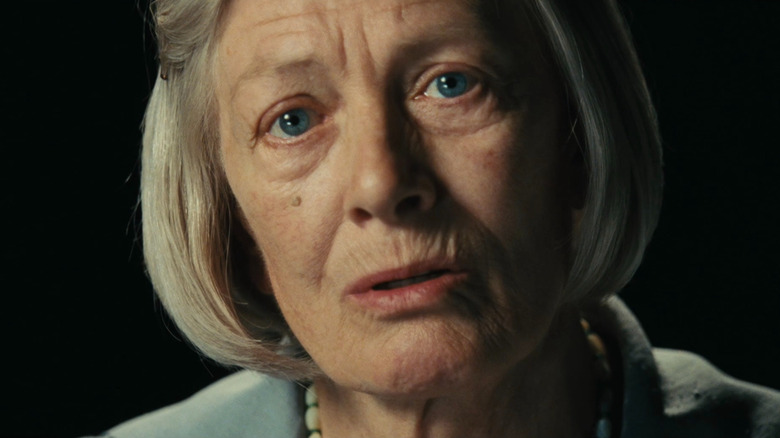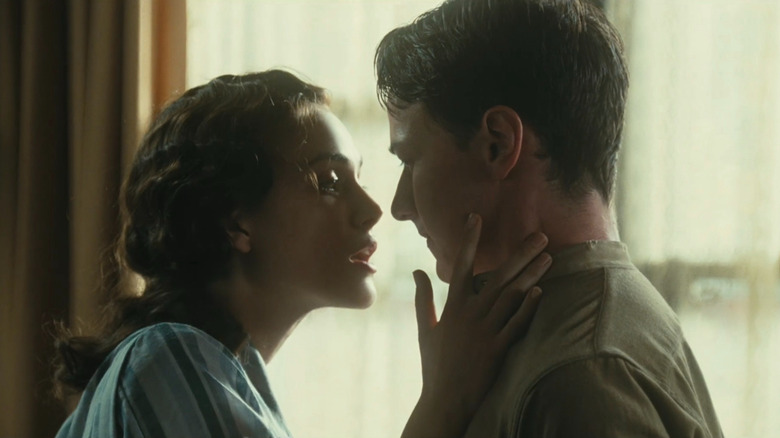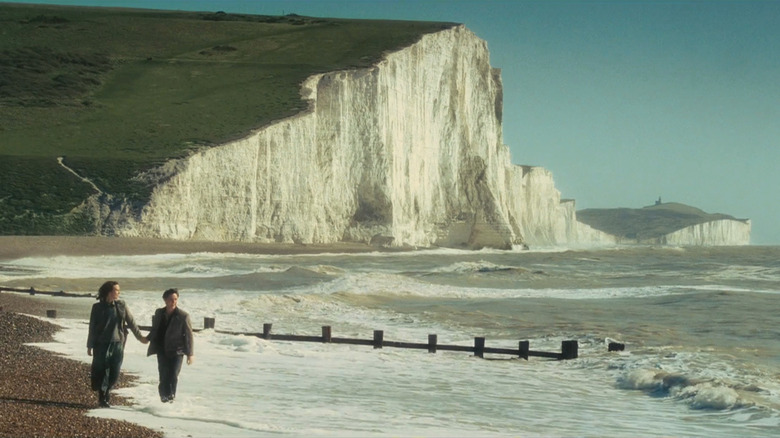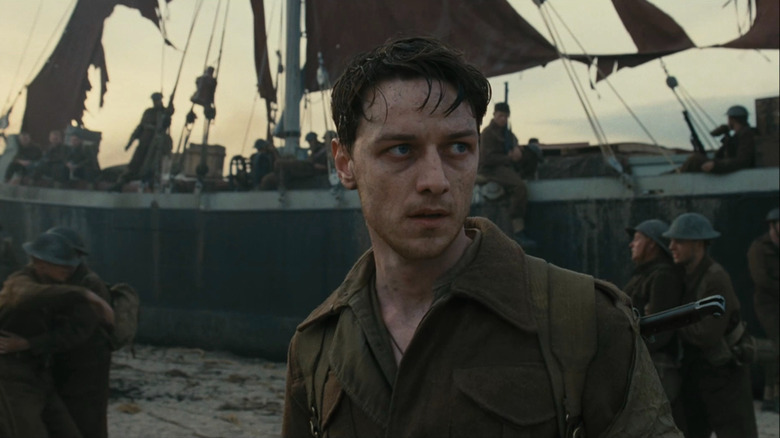Atonement Ending Explained: The Stories That Hurt And Heal
If executed well, twist endings can result in a fun experience. Having the rug pulled out from under you in a way that sheds new light on the entire film can make you instantly want to watch the rest of the film again. Whether it's "The Usual Suspects," "Fight Club," or "The Sixth Sense," the twist sends a blast of dopamine through your brain that leaves you walking out of the theater on a dizzying high.
Rarer are the twist endings that leave you utterly bereft and devastated, where that hit of dopamine is replaced by crushing defeat. Attempting this kind of ending can be enormously precarious, as you introduce the distinct possibility of completely alienating your audience. Sometimes that's the point, like in Michael Haneke's "Funny Games," but more often than not, you are looking to give the viewers an emotionally cathartic ending that is in keeping with the narrative.
Few films in the 21st Century have threaded this needle more successfully than Joe Wright's 2007 romantic war tragedy "Atonement," starring Keira Knightley, James McAvoy, and Oscar-nominated newcomer Saoirse Ronan. In a year of cinema filled with bleakness from "No Country for Old Men" to "There Will Be Blood," Wright's film carved out a space for its own bleakness in a kind of highly emotional melodrama that remains as potent as ever, due in no small part to the film's dynamite twist ending that still reduces me to a puddle of tears every single time I watch it. Most twist endings excite you, but in "Atonement," all you want to do is pretend it's not real, which is what makes it so good.
What you need to remember about the plot of Atonement
"Atonement" begins in the mid-1930s at the Tallis family estate. Amongst the family are Cecilia (Keira Knightley) and her precocious younger sister Briony (Ronan), a burgeoning writer who has a massive crush on the housekeeper's son Robbie (James McAvoy). What Briony doesn't know — or perhaps what she doesn't want to know — is that Cecilia and Robbie have a scintillating flirtation with one another, escalating dramatically when Robbie accidentally sends an incredibly sexual letter to Cecilia rather than the apologetic love note he intended. The two end up having sex against a bookcase in the family study, which is interrupted by Briony who interprets their encounter as rape.
During a big family dinner, the younger twin brothers of Cecilia and Briony's cousin Lola (Juno Temple) go missing, and everyone goes out searching for them. In the dark of the night, Briony happens upon Lola actually being assaulted by a man, and when questioned about it, she identifies the attacker as Robbie even though he is completely innocent. The actual attacker was Paul Marshall (Benedict Cumberbatch), a friend of Cecilia and Briony's older brother. Because of Briony's testimony and Lola's willingness to go along with it in the aftermath of her trauma, Robbie is sentenced to prison, separating him from a distraught Cecilia.
Several years later, Robbie joins the army to commute his sentence. Before he ships out, he's able to reconnect with Cecilia, who has become a war nurse, and they affirm their love for each other. Briony (now played by Romola Garai) has also become a nurse, but Cecilia has completely cut her out of her life because of what she did. Robbie ends up wounded in the Battle of France but makes his way to Dunkirk to be evacuated.
What happened at the end of Atonement?
Briony has realized the error of her ways and that it was in fact Paul Marshall who assaulted Lola, a memory that is stirred back up when she learns that the two are to be married. She reaches back out to her older sister to apologize, and learns that Cecilia and Robbie have made a modest life together since his return from the war, which has made its mark on Robbie's psyche. Briony wants to find a way to clear Robbie's name, but because the law does not require that Lola testify against her husband, who is the only other corroborating witness, they are left without any options.
The film then jumps many decades later to an elderly Briony (Vanessa Redgrave), who has become a very successful novelist, giving a television interview about her latest work called "Atonement." In the interview, she reveals that the beginning of the book was based on her real life, but that once Cecilia and Robbie were separated after Briony caused Robbie's arrest, the two never reconnected. Robbie was injured in battle, but he never made it out of France. He died alone of sepsis. Cecilia died not too much later as a result of a bomb during the Blitz. Cecilia and Robbie never did have a happy life together, but Briony was able to give them one in the pages of her novel, which is to be her final work due to her being diagnosed with vascular dementia. The film ends on the imagined Cecilia and Robbie enjoying their life together at a house by the sea, which the two wished to have.
What the end of Atonement means
Although you may not realize it as you're watching it — as you get swept up in the highs and lows of romance and war — at its core, "Atonement" is a story about storytelling. Throughout the picture, we are shifting between various viewpoints, be it Briony's, Cecilia's, or Robbie's. On several occasions, we even see the same scene several times from different points of view. Our experiences, biases, and emotions affect how we see every single thing that happens in our lives. Because of that, every person has their own story to tell, and in the case of Briony, her original sin is telling a story distorted by her own experiences, biases, and emotions.
Because of that story, she irrevocably destroyed the lives of the two people she held closer than just about anyone else in the world, and due to their untimely, premature deaths during World War II, Briony reaching out to reconcile and ask for forgiveness was never even a notion she could entertain. The only way she could give some grace to the lives of Cecilia and Robbie was by telling another story. Just as in her original story, it is a lie, but instead of jealousy and adolescent angst being the motivation behind the lie, it is a lifetime of regret and pain that motivates this one.
By writing this book and giving a wide populous a story of two people who were able to be together after enduring unimaginable adversity, she's giving people the desire to live their lives more in tune with their own emotions. Even though Cecilia and Robbie couldn't actually live this life, that doesn't mean others can't. Stories have the ability to change people's lives, and no one knows that better than Briony.
Another possible explanation of the ending
Because film is such a powerful medium, many people in the audience perceive what they see on the big screen as real. They become so emotionally invested in the world of the film that what happens to the characters can feel like it's happening to someone incredibly close to them. The reason I feel so devastated at the end of "Atonement" is because I have come to care deeply about Cecilia and Robbie. The chemistry between Keira Knightley (quite possibly my favorite working actor) and James McAvoy is more than just sensual and loving. Their connection feels mythic, as if no two people have belonged more to each other than these do.
By showing us how that love could have borne out and then telling us it in fact didn't, Joe Wright has created an ending that makes the audience feel like it's in mourning for a love we once had that is now gone. I do not doubt that a decent portion of the audience will see that ending and harbor even further resentment of Briony than they already did. What some will see as grace others will see as a further betrayal because her story isn't "real." Cecilia and Robbie's relationship isn't "canon."
What makes the ending so powerful is that I can emotionally react to "Atonement" in this fashion, but I can simultaneously react intellectually to its ideas about storytelling. I can fully understand Briony's point of view while also crafting my own through my experiences, biases, and emotions. It's an ending equally as satisfying for your heart and your head.
What has Joe Wright said about the ending?
Joe Wright was drawn to "Atonement" due in large part to its musings on storytelling, going so far as to say in one of the Blu-ray featurettes that he put back in the script instances of seeing the same scene multiple times from different points of view. But when it comes to the ending, he knows that Briony is "the God of this story," as he says in the film's audio commentary. As to what the ending means to him, it's all about the purpose of happy endings in narratives:
"What is the role of a happy ending, for the storyteller and also for the audience? And I think in the end, we decide that happy endings are important. They do serve a purpose. They do give us something to aspire to. They ennoble the human spirit, and I think that's a very, very important purpose. And has this film got a happy ending? I'm not sure. I think it's up to the audience."
Even if he isn't sure about whether or not "Atonement" has a happy ending, Wright is certain about what he thinks about them:
"I used to think that happy endings were a sign of weakness or evasion, and I've changed my mind since making 'Pride & Prejudice' and certainly since making this film. Happy endings can be a sign of strength."
I agree with his ethos on the notion of happy endings. I also agree with him that I'm not sure if this film has one. It does, and it doesn't. Some would call that bittersweet, but I don't find that to be a strong enough word for the walloping force that is the ending of "Atonement." All I can say is it has the perfect ending.
